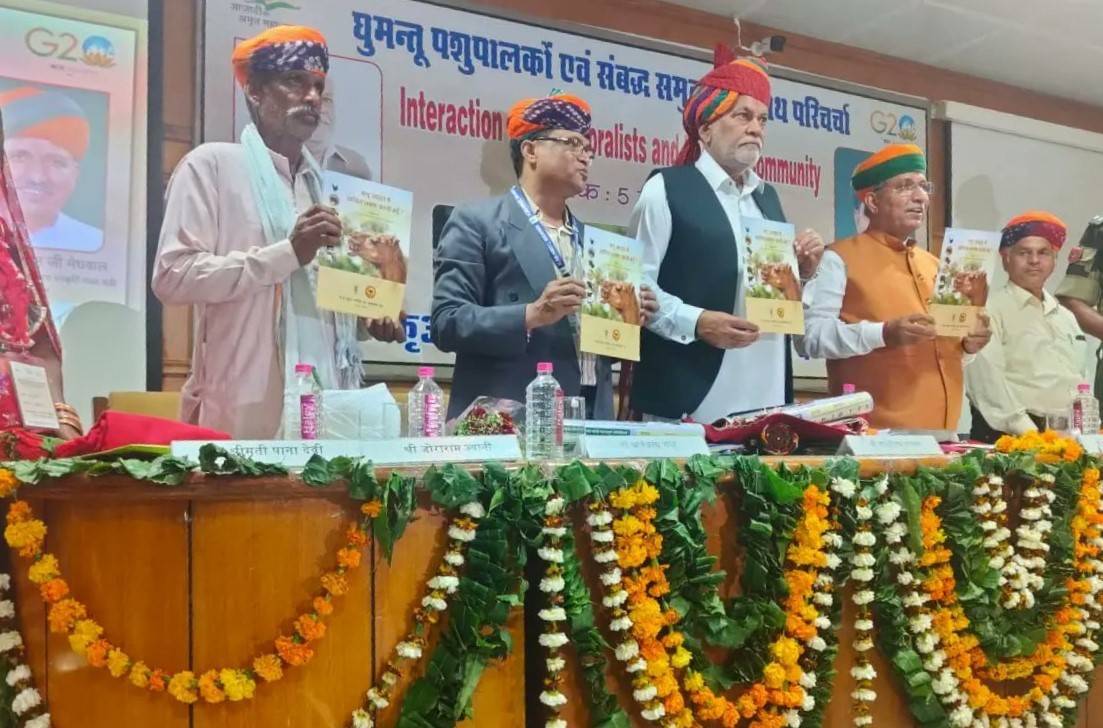
The programme started with tree plantation and inauguration of 'Camel product processing utilization and training wing'. As part of the programme, an open discussion on the issues and challenges faced by camel, goat, and sheep rearing pastoralists was held, followed by an award ceremony.
The open discussion focused on consultation with stakeholders in order to effectively channel their aspirations and issues into policy formulation as part of people-centric governance. Arjun Ram Meghwal, Minister of State for Parliamentary Affairs and Cultural Affairs, was also present at the event.
Parshottam Rupala stated during the open discussion programme with the pastoralist community that we have decided that wherever we go and as much as possible, we will have direct communication with the nomadic animal husbandry brothers and sisters who are at the lowest level in the field of animal husbandry. The Minister also stated that the Prime Minister's announcement of people-centered good governance is the heart of our commitment.
On January 27, 2023, Parshottam Rupala, Union Minister of Fisheries, Animal Husbandry, and Dairying, Government of India, convened a one-day physical interaction with representatives of pastoral communities, State Government representatives, NGOs, and ICAR institutes. The first pastoral cell meeting was held on March 2, 2023, under the chairmanship of Joint Secretary, National Livestock Mission.
This meeting included discussions with 18 representatives from various pastoralist communities, NGOs, and state agencies. The meeting decided that the Department of Animal Husbandry and Dairying will issue an advisory to state governments to help them deal with the challenges that pastoralist communities face.
The state governments were asked to establish a pastoralist grievance redressal centre at the state level. It was decided that the Department of Animal Husbandry and Dairying will request that the Ministries of Education, Women and Child Development and Food Processing Industries send a list of their schemes from which pastoralists can benefit. Few representations fall under the jurisdiction of the State Departments.
It has been decided that those representations will be forwarded to the concerned state governments, who will take the necessary action and notify the Department of Animal Husbandry and Dairying.
Pastoralism is a type of animal husbandry in which livestock are reared by grazing in pastures, traditionally by nomadic people who moved with their herds. Sheep, goats, camels, cattle, buffalo, yaks, and donkeys are among the animals involved. A note on the various schemes of the DAHD, Govt. of India, under which pastoralists can be assisted is distributed to all State Animal Husbandry Departments. The Ministry of Fisheries, Animal Husbandry, and Dairying has made 'Kisan Credit Cards' available to pastoral communities.
To prioritize enabling policies, the Government of India has established a pastoral cell in the Department of Animal Husbandry and Dairying, which is overseen by the Joint Secretary of the National Livestock Mission. The Ministry of Environment, Forests, and Climate Change, the Ministry of Home Affairs, the Ministry of Tribal Affairs, the Ministry of Agriculture and Farmers Welfare, and ICAR-IGFRI, Jhansi are all asked to nominate one representative to the pastoral cell. The Ministry has also decided to include information about pastoral communities in the upcoming 21st Livestock Census, which is set to take place in 2024. Detailed information about pastoralists is required for the successful formulation and implementation of any scheme or policy advocacy.
In response, the states of Rajasthan, Gujarat, Karnataka, Orissa, Andhra Pradesh, Himachal Pradesh, Uttarakhand, Uttar Pradesh, Sikkim, J&K, Ladakh, and Arunachal Pradesh were asked to provide information on their respective pastoralist communities. Uttarakhand, Rajasthan, Ladakh, Himachal Pradesh, Karnataka, Sikkim, and Jammu and Kashmir have so far provided information.
















